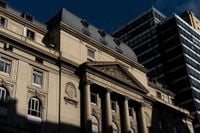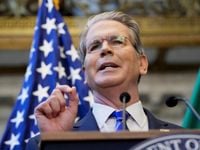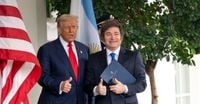On October 14, 2025, the White House became the stage for a high-stakes diplomatic embrace between President Donald Trump and Argentina’s embattled leader, Javier Milei. The meeting, set against the backdrop of the looming Argentine midterm elections, signaled a dramatic escalation in U.S. involvement in Argentina’s economic crisis—one that would soon send ripples through global markets, ignite political tempers across Buenos Aires, and raise pointed questions about the boundaries of international support.
Just a day after the two presidents met, U.S. Treasury Secretary Scott Bessent announced plans for a sweeping new package of financial assistance. The United States, Bessent revealed, is working to assemble a $20 billion private-sector facility for Argentina, supplementing a $20 billion credit swap line already pledged by the U.S. Treasury earlier in October. The combined $40 billion figure, double the previous commitment, stunned observers and briefly sent Argentina’s sovereign bonds and stocks soaring. According to AFP, some stocks on the benchmark Merval index rose by nearly 10 percent on the news, a rare moment of optimism for a market battered by months of economic turmoil.
“We are working on a $20 billion facility that would complement our swap line, with private banks and sovereign funds that, I believe, would be more focused on the debt market,” Bessent told reporters in Washington on October 15. He added, “Many banks are interested in it and many sovereign funds have expressed interest.” Bessent emphasized that he had spent weeks developing this private-sector solution, which aims to help Argentina meet its daunting debt payments and shore up its rapidly depreciating currency. The U.S. Treasury had already begun purchasing Argentine pesos to help support the currency on global markets, Bessent confirmed.
The announcement came on the sidelines of the annual meetings of the International Monetary Fund (IMF) and World Bank, where the IMF—already running its own multibillion-dollar loan program with Buenos Aires—expressed support for Washington’s bilateral efforts. The timing was no accident. By unveiling the package during these influential gatherings, the U.S. sought to underscore its commitment to a major regional ally and to send a message about the scale of international cooperation required to stabilize Argentina’s economy.
But the dramatic offer of support came with an unmistakable political edge. President Trump, a self-described admirer of Milei’s libertarian reforms, made clear that the fate of U.S. aid was tied to the outcome of Argentina’s October 26 midterm elections. “If he loses, we are not going to be generous with Argentina,” Trump warned. In a separate remark, he added, “If he does win, we’re going to be very helpful. And if he doesn’t win, we’re not going to waste our time, because you have somebody whose philosophy has no chance of making Argentina great again.”
The reaction in Argentina was swift and, for many, furious. Former President Cristina Fernández, currently under house arrest after a corruption conviction, wrote on social media: “Trump to Milei in the United States: ‘Our agreements depend on who wins election.’ Argentines … you already know what to do!” Martín Lousteau, president of the centrist Radical Civic Union, echoed the frustration, saying, “Trump doesn’t want to help a country — he only wants to save Milei,” and warning that “nothing good can come of this.” Maximiliano Ferraro, head of the opposition Civic Coalition, labeled Trump’s comments “a blatant act of extortion against the Argentine Nation.” Economist Carlos Melconian, former head of state-owned Banco Nacion, called it “a quasi-colonial incursion” into Argentina’s affairs, according to AFP.
Market reaction was equally volatile. The Argentine peso weakened by about 0.7 percent on October 15, trading at 1,395 pesos per U.S. dollar, compared to 1,385 the previous day, as reported by the Associated Press. The dollar remains the currency of choice for Argentines seeking to protect their savings, and the peso’s continued slide underscored the fragility of confidence in Milei’s government. Meanwhile, shares of major Argentine companies, which had dropped as much as 8.1 percent after Trump’s remarks, rebounded slightly on the promise of new aid.
Bessent, perhaps sensing the diplomatic fallout of Trump’s statements, worked to clarify the U.S. position. “It is not election-specific. It is policy-specific,” he said, emphasizing that U.S. support would continue as long as Argentina pursues “good policies,” regardless of the election’s outcome. “So as long as Argentina continues enacting good policy, they will have US support.” He noted that Milei would continue to enjoy U.S. backing for as long as he has a blocking veto on legislation in Congress.
Milei, for his part, struck a confident tone in a broadcast interview on October 15, declaring, “We continue to advance the ideas of freedom, so at least until 2027 we have that support assured.” He pledged to maintain his libertarian agenda, saying, “I have no intention of changing course until the end of my term. I am committed to the agenda of lowering taxes, deregulating and keeping the economy growing.” Milei, an economist by training, voiced hope that the midterm elections would increase his base and allow him to push his reforms further.
Yet, the president’s position has grown more precarious in recent months. After sweeping budget cuts and efforts to quell inflation, Milei has faced fierce opposition and widespread protests. His coalition, La Libertad Avanza, is expected to fall far short of a majority in Congress, with political scientist Gustavo Marangoni telling AFP that Milei’s bloc had “no chance of winning a majority.” Last month, Milei suffered a stinging defeat in Buenos Aires provincial polls—a bellwether for national sentiment—and his administration has been rocked by a corruption scandal involving his sister and close adviser, Karina Milei.
Meanwhile, trade talks between the U.S. and Argentina are ongoing, with government sources suggesting that an agreement eliminating or reducing tariffs on more than 100 products could be announced soon. Economy Minister Luis Caputo and Deregulation & State Transformation Minister Federico Sturzenegger both hinted at an imminent deal, with Sturzenegger calling it “a fairly unprecedented trade agreement within the United States.”
For now, the $40 billion in U.S. aid remains a lifeline for Milei’s government, but it is a lifeline tangled in political strings. The coming weeks—and the results of Argentina’s midterm elections—will determine whether this bold experiment in financial diplomacy can stabilize a faltering economy, or whether it will deepen the divisions and uncertainties facing one of Latin America’s largest nations.



